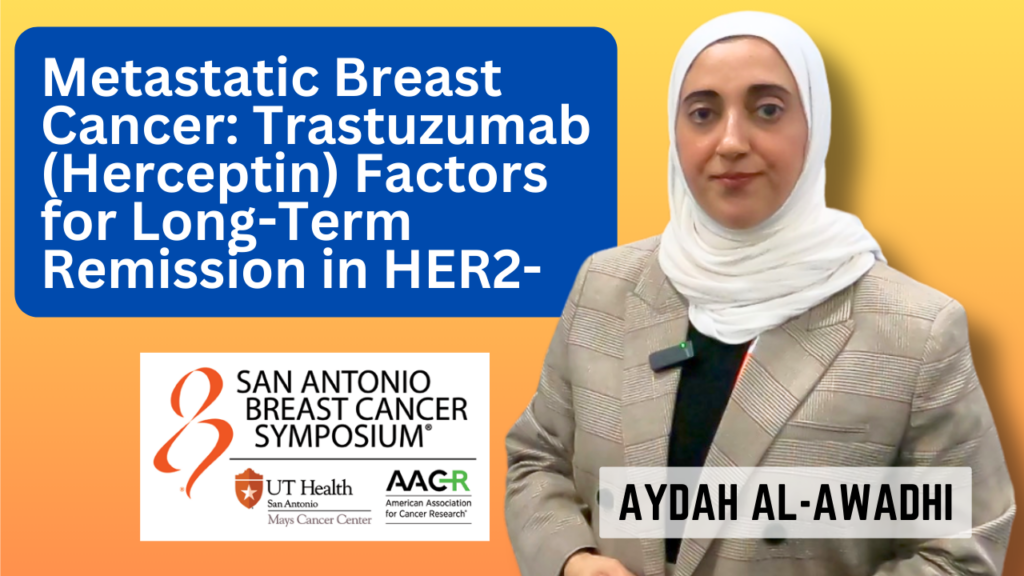“So basically, we looked at two factors, the one saying the long term remission of heart positive metastatic breast cancer patients treated with trastuzumab based therapy. We specifically looked at some of those that had prolonged remission for more than five years.” – Dr. Aydah Al-Awadhi
In an enlightening deep dive into the world of oncology, Dr. Aydah Al-Awadhi shares insights from a single-center retrospective analysis focused on the factors contributing to long-term remission in patients with HER2-Positive Metastatic Breast Cancer treated with Trastuzumab-based therapy.
Study Overview:
- Patient Demographics: The study included 105 patients diagnosed with HER2-positive breast cancer between 2015 and 2019, both in recurrent and de novo settings.
- Study Outcomes: The focus was on time to tumor progression, comparing those who remained on therapy for less than five years with those who benefited from prolonged treatment.
- Findings: Factors like older age, better initial performance status, and the absence of brain metastases were linked to extended remission periods.
Clinical Implications:
- Brain Metastases: Vigilance in monitoring for symptoms of brain metastases is crucial, as these can significantly affect patient outcomes. New therapies, including antibody-drug conjugates, offer hope for better control in cases where progression occurs on trastuzumab.
- Quality of Life: Frequent hospital visits can impact patient adherence and quality of life. Dr. Al-Awadhi emphasized the importance of treatment compliance, noting that interruption can increase the risk of progression significantly.
- Cardiac Toxicity: Although not common, cardiac monitoring is integrated into the treatment strategy to manage potential side effects effectively.
This study not only sheds light on the predictors of long-term remission but also underscores the need for tailored treatment approaches and vigilant patient monitoring to enhance outcomes in HER2-positive metastatic breast cancer patients.
“So what we found is that the study identified factors associated with prolonged remission, which is more than five years, including older age at diagnosis, better performance status, de novo metastatic disease, and no brain metastases, which overall predict a favourable prognosis for these patients.” – Dr. Aydah Al-Awadhi
🔍 Chapters:
0:00 – Introduction to HER2+ Metastatic Breast Cancer
0:06 – Overview: Long-Term Remission and Trastuzumab Therapy
0:17 – Baseline Characteristics of Prolonged Remission
0:24 – Key Findings: Prognostic Factors for 5-Year Remission
0:38 – Brain Metastases: Vigilance and Management Strategies
0:59 – Innovations in Treatment: Antibody-Drug Conjugates
1:18 – Addressing Quality of Life and Adherence Challenges
1:35 – The Impact of Treatment Interruptions on Progression
2:13 – Monitoring and Managing Cardiac Toxicity
For more information or to discuss this topic, feel free to comment below or reach out through our contact form.

